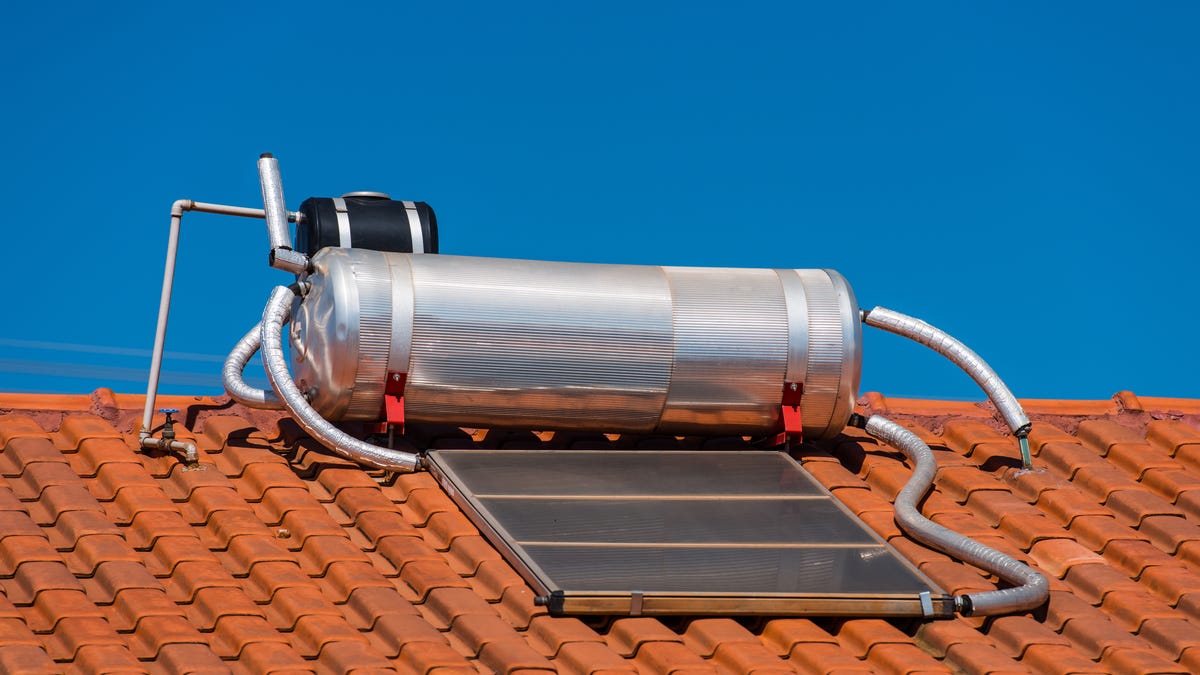4 Cheaper Solar Energy Options to Use at Home
These solar energy devices let you go solar without the huge down payment, or the waiting time.

A solar water heater is just one way to add renewable energy to your home without installing a full-scale solar system.
Along with most everything else, solar prices increased in recent months, even if they're still much cheaper than they were a decade ago. Come 2023, the Inflation Reduction Act can save you money on energy efficiency upgrades and it already boosted the solar tax credit to 30%. But if you can't quite swing the cost of rooftop solar right now, there are other (cheaper!) ways to start using solar power right now. They won't save as much in the long term as rooftop solar panels, but they do shift some of your energy use to a renewable source.
If your ultimate goal is rooftop solar panels, you can learn about financing options and local incentives that can make the cheaper over all. Then check out what you need to know about buying solar panels and where you can shop for them.
Read more: Best Solar Companies of 2022
Can solar panels save you money?
Interested in understanding the impact solar can have on your home? Enter some basic information below, and we’ll instantly provide a free estimate of your energy savings.
There are a multitude of stationary and portable lights that can run on solar power that you can easily add to your home.
Start your solar journey in your yard. Solar walkway lights can keep you from tripping in the dark and solar string lights or twinkle lights can add ambience to a backyard patio. Installation is a snap. Simply string the lights where you want them and make sure the solar panels are facing the sky.
Don't forget about your porch light. For less than $40, you can grab a solar option like the Gama Sonic Solar Outdoor Wall Lantern. You can also illuminate any unwelcome visitors using the power of the sun. For $22 you can grab two motion-sensing solar security lights.
Eliminate the risk of dead devices with a power bank that can recharge anywhere there's daylight. Solar power banks, like the Portable Solar Power Bank ($15), let you charge your phone as well as other small gadgets on the go. You'll spend far less time searching for a wall outlet.
Solar power banks do charge devices slower than a wall outlet. But, if you recharge the bank in the sunlight and use it to charge your device while you sleep, a speedy charge isn't a necessity.
Look for a solar charger that can charge your devices while recharging its own battery via its solar panels. Also, confirm how many items it can charge at once and whether it protects devices from overcharging.
Don't stop at powering your devices with solar. You can also power small home appliances -- like your coffee maker, fan, backup lights and laptop -- without using your utility. Enjoy some creature comforts even in a blackout or far from an outlet.
Find a portable power station that can charge with solar panels, and you're good to go. More and more of these solutions, often called solar generators, are becoming available every day. Jackery says its Solar Generator 160 can keep your laptop running for two additional hours, charge your phone 16 times or run a light for 29 hours. You can get the battery and the solar panels to charge it for $320.
Your typical water heater uses around $440 dollars worth of electricity per year. You can save that money by going solar. There are solar water heater kits you can buy for $250 to $1,200, so they pay for themselves very quickly.
There are three different types of solar water heaters. They all capture solar heat to warm water then store it until it's needed and are usually installed on a roof for maximum sun exposure.
Batch collectors, also called integrated collector storage systems, are the oldest types of solar water heaters and they are still popular because they need very little sunshine to heat water and they are simple to install. Batch collectors use large black tanks or tubes to collect solar heat to warm the water inside of them.
Flat-plate collector water heaters have a heat absorbing plate that collects heat from the sun, then transfers the heat to copper tubes. As the tubes heat up, so does the water inside them, though not as consistently as other choices.
Evacuated tube collectors are considered the most productive solar water heaters. Glass or metal tubes full of water or heat transfer fluid are placed inside larger glass tubes, creating a vacuum. In this vacuum, very little heat is lost, so the water is heated very efficiently. Another benefit is it can even be used in outdoor temperatures as low as 40 F, according to the Environmental Protection Agency.
Solar water heaters, more than the other options, can get a bit pricey and should be installed by a professional. Still, in some applications, they can be a money-saving move. They are also eligible for a federal tax credit. A professional can help you select the right size for your needs, but you can start exploring your options, like these evacuated vacuum tube offerings from Duda, starting at $1,310.




